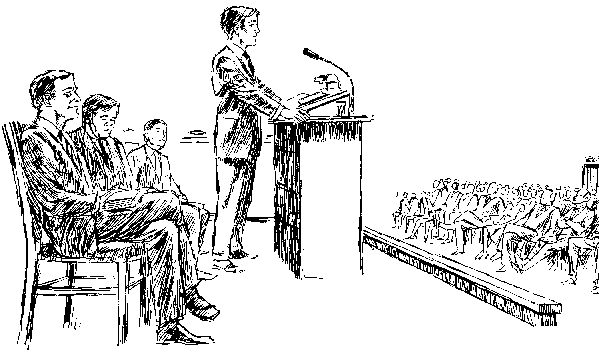Justification
by Faith and the Current Religious Scene
 Robert
Brinsmead, former editor of Present Truth Magazine Robert
Brinsmead, former editor of Present Truth Magazine
PART 1
A Friendly Dialogue with Campus Crusaders
In his recent speaking itinerary through the United
States, this editor had the privilege of friendly dialogue with some
fine Christian gentlemen from Campus Crusade for Christ (C.C.C.) who
happened to attend his seminars. The substance of these exchanges,
taken from notes, is here reproduced. This editor has had
a long acquaintance with C.C.C. through careful reading of most of
the available literature and by contact with supporters and advocates
of the movement.
The comments in the following discussion, more often than not, deal
with general principles and revivalism in general. This is done because
it would be unfair to single out C.C.C. for criticism that should
be directed to the overall evangelical scene. Although the questions
and answers were expressed out of deep conviction and concern, a good
spirit prevailed in the discussion, proving that Christians can sometimes
disagree without being disagreeable.—R.D.B.
Q. What are your impressions of the Campus Crusade movement?
Ed. The Campus Crusade movement is one of the most
notable expressions of American evangelical revivalism today. It
has a superb organization that is going, growing and fantastically
successful. The office staff at the world headquarters are young,
attractive, charming, gracious and vibrant. They and the mainstream
of the movement represent the cream of American youth—educated,
idealistic, middle-class. They have an irrepressible zeal and enthusiasm
that is contagious. Who wouldn't be impressed! Q.
Do you agree with the claim that the revivalism seen in Campus Crusade
is part of a great spiritual revival?
Ed. Dr. Bill Bright told me personally that we are now witnessing
the greatest spiritual revival seen on this earth since the days
of the apostles.
I think you would agree with me that numbers and noise are not the
only indications of the value of a revival. We need to take into
account the basic questions people are grappling with, or what Nygren
would call the fundamental motif of a spiritual movement.
Consider the two great religious revivals that were so revolutionary
that they actually changed the course of history. I am referring
to the revivals in the times of the apostles and the Reformers.
What was the central concern? The basic question people were asking
was, "How can a man be just with God?" "How can I
be acceptable and pleasing before a righteous and holy God?"
The question was theocentric. Men's earnest inquiry grew out of
an overwhelming sense of God's holiness and their own guilty standing
and corrupt state.
This is not really the basic question that people are asking in
present-day revivalism. This has been a very permissive age, and
a lot of it has rubbed off on those of us who call ourselves evangelical.
God is cast in the role of an easy-going Benevolence who forgives
sin out of sheer mercy. There is very little confrontation with
the God of law, righteousness and judgment. Few of us are confronted
with Luther's question, "How can I find a gracious God?"
We take it for granted that God is gracious. Never have young people
had so much time, so much freedom and so many means to run after
pleasure. Yet they are bored and unsatisfied. The uppermost question
they are asking is, "How can life become an exciting adventure?
How can I have a bundle of fun? I have tried sport, sex, pot . .
. What next?" In the context of this question, revivalists
come along and say, "Try Jesus."
You may ask, "What is wrong with trying Jesus?" Our reply
is this: Man's original sin was to make his own happiness his primary
concern. (The Greeks called this eudaemonism, which means
making the attainment of happiness the goal of life.) The
ultimate sin is to enlist Christ as a means to this end.
We seriously question the fundamental motif of much of this type
of revivalism. It is egocentric instead of theocentric. It does
not change the goal but merely changes the method. Instead of regeneration
(the creation of a new motif, a new goal and a new center), it offers
sublimation. (Man merely pursues his egocentric goals on a higher
level.)
If the current religious fervor is to have any depth or substance,
it has to be on a higher plane than eudaemonism. We have to stop
trying to deal with God as if He were Santa Claus. ("We believe
in you, Santa Claus. Now let's get down to the real thing. Where
are the toys?")
We desperately need to hear the gospel preached in the Biblical
context of our accountability before God's law and His judgment
seat. Says the Revelator:
"And
I saw another angel fly in the midst of heaven, having the everlasting
gospel to preach unto them that dwell on the earth, and to every
nation, and kindred, and tongue, and people, saying with a loud
voice, Fear God, and give glory to Him; for the hour of His judgment
is come: and worship Him that made heaven, and earth, and the
sea, and the fountains of waters." Rev. 14:6, 7.
When the demands of God's
law and the reality of judgment take hold of the ears of people,
they will no longer be asking, "How can Christ satisfy my desire
to have a grand ball and a bundle of fun?" but, "How can
I satisfy God's righteous claims upon my life?"

Q. "Present Truth Magazine" seems to be knocking experience.
Do you discount the need for a real experience?
Ed. On the contrary. What we are saying is this: The only
way to get a real Christian experience is to stop making it your
focal point of concern. This may sound paradoxical, but divine truth
is full of paradoxes. The only way to live is to die; the only way
to save your life is to lose it; you become rich by forsaking all;
and so on.
When I was a boy, my daily chore was to milk an ornery, old, red cow. Instead of standing in the center of the stall, she had a frustrating habit of standing at an angle. Then there was insufficient room between the wall and her body for me to operate. The more I tried to push her away from the wall, the more she would lean her body toward the wall. Since she was stronger than I was, I had to devise another plan. I found that by going around on the other side and pushing her toward the wall, she would push back until she was standing in dead center—just where I wanted her. So I got the desired result by pushing in the opposite direction.
 The surest way to fail in our Christian experience is to join the multitude who are caught up in the frantic pursuit of a satisfying Christian experience. Books on how to find this joyous, satisfying, deeper experience, fill the land like the frogs of Egypt. A man or woman who can regale other seekers with his own fantastic religious experience is much sought after to revive the saints. The appeal of almost all revivalism is the prospect of discovering a marvelous human experience. How different is all this subjective revivalism from the objective
message of the apostles. These men did not turn the world upside
down by telling people about their exciting experience, nor was
the burden of their preaching to tell people how to discover the
ecstatic experience of a Spirit-filled life. They had something
infinitely bigger and more weighty about which to preach. God Himself
had visited this planet in the person of Jesus Christ. By the amazing
spectacle of a sinless life, He fulfilled the law for all men. By
dying on the cross, He took our place, made atonement for all sin
and buried our life of failure in the tomb. By the power of His
resurrection, He destroyed death, opened Paradise and shut the gates
of hell for every believer. Hear Paul proclaim: The surest way to fail in our Christian experience is to join the multitude who are caught up in the frantic pursuit of a satisfying Christian experience. Books on how to find this joyous, satisfying, deeper experience, fill the land like the frogs of Egypt. A man or woman who can regale other seekers with his own fantastic religious experience is much sought after to revive the saints. The appeal of almost all revivalism is the prospect of discovering a marvelous human experience. How different is all this subjective revivalism from the objective
message of the apostles. These men did not turn the world upside
down by telling people about their exciting experience, nor was
the burden of their preaching to tell people how to discover the
ecstatic experience of a Spirit-filled life. They had something
infinitely bigger and more weighty about which to preach. God Himself
had visited this planet in the person of Jesus Christ. By the amazing
spectacle of a sinless life, He fulfilled the law for all men. By
dying on the cross, He took our place, made atonement for all sin
and buried our life of failure in the tomb. By the power of His
resurrection, He destroyed death, opened Paradise and shut the gates
of hell for every believer. Hear Paul proclaim:
"Christ
has utterly wiped out the damning evidence of broken laws and
commandments which always hung over our heads, and has completely
annulled it by nailing it over His own head on the cross. And
then, having drawn the sting of all the powers ranged against
us, He exposed them, shattered, empty and defeated, in His final
glorious triumphant act." Col. 2:14, 15, Phillips.
The gospel is the good
news of what God has done outside of us in the person of Christ.
It is the proclamation of a historic, objective reality. It is not
about our experience but about Christ's experience. This was the
central affirmation of the apostles.
The New Testament message of justification by Christ's imputed
righteousness means that we are accepted by a life lived and
a work done outside of ourselves. The focus is not internal but
external. It is Christ's experience that is of supreme importance
to us. "By His knowledge [His experience of bitter suffering
and death] shall My righteous Servant justify many." Isa. 53:11.
"We shall be saved by His life." "By the obedience
of One shall many be made righteous." Rom. 5:10, 19. All that
is necessary for our acceptance and fellowship with God has been
done. There is no need to chase after some elusive, mystical experience
to give me status with God, with my fellows or with myself. Faith
looks up and says, "Mine are Christ's living, doing, and speaking,
His suffering and dying; mine as much as if I had lived, done, spoken,
and suffered, and died as He did."—-Luther's Works
(Philadelphia: Muhlenberg Press, 1957), Vol. XXXI, p.297. Does this
do away with Christian experience? Certainly not! It is the only
way to have a good experience. Listen to these words from Luther:
"For 'gospel' [Evangelium] is a Greek word
and means in Greek a good message, good tidings, good news, a
good report, which one sings and tells with gladness. For example,
when David overcame the great Goliath, there came among the Jewish
people the good report and encouraging news that their terrible
enemy had been struck down and that they had been rescued and
given joy and peace; and they sang and danced and were glad for
it [1 Sam. 18:6].
"Thus this
gospel of God or New Testament is a good story and report, sounded
forth into all the world by the apostles, telling of a true David
who strove with sin, death, and the devil, and overcame them, and
thereby rescued all those who were captive in sin, afflicted with
death, and overpowered by the devil. Without any merit of their
own he made them righteous, gave them life, and saved them, so that
they were given peace and brought back to God. For this they sing,
and thank and praise God, and are glad forever, if only they believe
firmly and remain steadfast in faith.
"This report and encouraging tidings, or evangelical and divine
news, is also called a New Testament. For it is a testament when
a dying man bequeaths his property, after his death, to his legally
defined heirs. And Christ, before his death, commanded and ordained
that his gospel be preached after his death in all the world [Luke
24:44-47]. Thereby he gave to all who believe, as their possession,
everything that he had. This included: his life, in which he swallowed
up death; his righteousness, by which he blotted out sin; and his
salvation, with which he overcame everlasting damnation. A poor
man, dead in sin and consigned to hell, can hear nothing more comforting
than this precious and tender message about Christ; from the bottom
of his heart he must laugh and be glad over it, if he believes it
true."—Selected Writings, Vol. IV, pp.394, 395.
To learn that my acceptance
with God is grounded on something entirely outside my own experience,
brings the joy of sheer freedom. When faith grasps that my righteousness,
security and real life are outside and above my own poor experience,
I am liberated from all this internal groveling. Christ, my Representative,
is accepted at the right hand of God; my Substitute is pleasing to
God; His righteousness satisfies justice. By faith I am accepted,
pleasing and righteous before God "in the Beloved" (Eph.
1:6).
Q. Then you are not against Christian enthusiasm?
Ed. Many stuffy, old churches need the youthful enthusiasm
of people like the Campus Crusaders. But we need to be careful that
our enthusiasm is in the objective gospel rather than in our own
subjective experience.
Mary Magdalene was certainly enthusiastic when she ran to the disciples
with the news of her risen Lord. But she didn't regale them with
details of how she felt. Peter did not bore his listeners on the
Day of Pentecost with a dry, theological discourse, nor did he tell
them about his exciting experience of being filled with the Spirit.
I read in a recent paper, "The kids are very excited about
what Jesus is doing in their lives." I met one of them—a fine,
nineteen-year-old co-ed. Asked to tell
what she was so enthusiastic about, she said, "I am excited
about what Jesus is doing in my life. It is just like being in love.
At times I am so excited I could lie down on the ground and scream."
Six months later she added this: "I have not yet recovered
from the awful after-depression of it."
 If a ship keeps its anchor within its own bosom, it will be tossed to and fro by every wind. To avoid being driven onto the rocks, it must cast the anchor to something outside of itself. If a ship keeps its anchor within its own bosom, it will be tossed to and fro by every wind. To avoid being driven onto the rocks, it must cast the anchor to something outside of itself.
There are two aspects of God's work—His work for us and His work in us. Faith must be grounded on His work for us. That is the gospel. It is the only thing big enough for security. Ten thousand ecstatic experiences won't save us or give us any status with God. The essence of God's work within us is to teach us to rely wholly on His work without us.
Paul sent Timothy to discover the state of the church in Thessalonica. "I sent to know your faith," he wrote in his letter to the church (1 Thess. 3:5). When we ask one another, "How is your experience?" we tend to direct our attention to the ups and downs of human experience. When we ask, "How is your faith?" we direct attention to the changeless reality of God's finished work in Jesus Christ. Q. Is it a mistake to look for a satisfying experience of inner
fulfillment?
Ed. Yes, it is a terrible mistake! Yet the search for inner
fulfillment is the fundamental motif of most evangelical revivalism. "Accept Christ into your heart and experience the satisfaction
of a fulfilled life," is the Campus Crusade sales pitch. There
are going to be a lot of frustrated people about soon. History has
furnished us with two great experiments in seeking internal fulfillment.
First, the medieval church demonstrated the results of trying to
find fulfillment in an internal experience. (In classical theology
this was called gratia infusa.) The result was some of
the greatest ignorance, superstition and religious corruption that
the world has ever seen. Second, the Renaissance has demonstrated
the results of trying to find fulfillment in humanism, rationalism,
and material and scientific idealism. The age in which man has reached
the moon is the most bewildered, disillusioned and frustrated age
in civilized history.
Shall we now return to the medieval principle of seeking fulfillment
and satisfaction in internal, spiritual experience? This is where
popular revivalism is now head.
The great Reformation of the sixteenth century grew out of an awakening
to the fact that life cannot be fulfilled within the historical
process—with or without grace. This is the very substance of what
the Reformers discovered in the doctrine of original sin. Human
nature is radically corrupt, and this corrupt nature remains even
in Christians until they die. "Every good work of the saints
while pilgrims in this world is sin," declared Luther when
writing against Latomus from the Wartburg — meaning that because
of the taint of human imperfection, no saint could satisfy the demands
of God's law. Even the good deeds of holy prophets are filthy rags
when compared with the righteousness which the law demands (Isa.
64:6). "O wretched man that I am! who shall deliver me from
the body of this death?" (Rom. 7:24). Such was the confession
of a Spirit-filled apostle. All continue to fall short of God's
glory (Rom. 3:23), and not even the best saint at his best state
with his best deed, can satisfy the righteousness demanded by God's
law. So the fact of original sin means that no man can experience
fulfillment within the historical process.
The Reformers found the solution to the human dilemma in the Pauline
doctrine of righteousness by faith — or the imputed righteousness
of Christ. This means that Christ is the one ideal Man, the only
One in whom God's purpose is fulfill. In Him every human
aspiration meets its total fulfillment, and in Him the law finds
entire satisfaction. In Him human nature is perfected, accepted
and restored to fellowship at the right hand of God. He is our Man,
His humanity is ours, and His righteousness is ours. Instead of
trying to find fulfillment in ourselves, faith finds it outside
of ourselves in the person of Christ. Says the apostle Paul, "Your
own completeness is only realized in Him." Col. 2:10, Phillips.
Within the historical process, this fulfillment is ours only by
faith, never by empirical reality until Christ shall come again.
In the present gift of the Holy Spirit, we have but the down payment
and first fruits of that inheritance (Eph. 1:13, 14; Rom. 8:23);
and instead of gloating in smug satisfaction about the enjoyment
of spiritual fulfillment, "we . . . groan within ourselves,
waiting for the adoption, to wit, the redemption of our body" (Rom. 8:23). Again we say, the principle of imputed righteousness teaches us
that we can find no internal fulfillment within the historical process.
Sin dwells yet in the best of saints (Eccl.. 7:20; 1 John 1:8).
Within there still remain things to perplex, discourage and frustrate.
Our fulfillment is outside of ourselves in the person of Jesus Christ.
We take consolation in His completeness, His righteousness, knowing
by faith that all which He is, God ascribes to us, and all that
He has belongs to us. No experience, absolutely none but His, will
ever satisfy. Any man who is sufficiently enlightened to know that
his own inner experience cannot satisfy the ideal of God's law,
will also know that it can't \satisfy himself.
 It is a sad spectacle to see this mad, Gadarene stampede after a
satisfying inner experience. Yet crusaders and revivalists tell
people that they can have it, deluded enthusiasts proclaim that
they have attained it, and books spell out secret formulas about
how to get it. It is sheer "evangelical" Romanism. In
fact, some Roman Catholic scholars are very critical (and rightly
so) of the extreme subjectivism manifested by Protestant revivalism. It is a sad spectacle to see this mad, Gadarene stampede after a
satisfying inner experience. Yet crusaders and revivalists tell
people that they can have it, deluded enthusiasts proclaim that
they have attained it, and books spell out secret formulas about
how to get it. It is sheer "evangelical" Romanism. In
fact, some Roman Catholic scholars are very critical (and rightly
so) of the extreme subjectivism manifested by Protestant revivalism.
Q. Didn't Jesus tell us that He came to give us an abundant
life?
Ed. Yes, it is a life filled with all the fulness of the
Godhead (Col. 2:9) and all the treasures of wisdom and knowledge
(Col. 2:3). That life is laid up for us at the right hand of God,
and we are directed to wait for Christ's coming for the empirical
possession of it (Col. 3:1-4). Meanwhile, it is ours by faith;
and by the gift of the Holy Spirit, we now enjoy only the "firstfruits,"
or down payment, of it (Rom. 8:23; Eph. 1:14).
Our complaint against the popular "deeper-life" movement
is not that it makes this "abundant life" too wonderful.
It does not present it as wonderful enough. It reduces it to the
imperfect state of Christian experience here below, where "the
flesh lusteth against the Spirit, and the Spirit against the flesh"
(Gal. 5:17).

Those who reduce the "abundant life" to the life here
and now, have no true perspective of the hope of Christ's coming.
They are like a bride who wants to have her honeymoon without the
personal presence of the bridegroom. The New Testament focuses on
two great events—the first coming of Christ and His return in glory.
Faith is directed to the finished work of His first advent and possesses
that abundant life by faith. Hope is directed to the second
advent, "when Christ, who is our life, shall appear" and
bestow that life upon us by empirical reality. If we try to bring
the "not yet" into the now, we will have a very poor substitute
for the real thing—as well as lose the eschatological tension of
the New Testament message.
Besides looking to the wrong life, this "radiant Christian
experience" mentality gives a romanticized coloring to Christian
sanctification. Bible sanctification is not a mystical, spiritual
rapture. It is not a happy flight of feeling. It is not taking off
on some mystical, spiritual trip. Bible sanctification means trusting
God in trial, in darkness as well as in the light; it is walking
by faith and not by sight; it is consistently obeying every word
from the mouth of God and steadfastly doing His will. In other words,
it is not measured by the state of religious feelings and is quite
different from some kind of spiritual euphoria. True Christian experience
does not always appear to be a spectacular adventure. But to fusslessly
trust God and keep His commandments is worth more than all the noise
of Christendom.
Q. On what basis do you say that most of today's evangelical
revivalism is more akin to Romanism than to the Reformation?
Ed. The main difference between the Reformers and Rome was
a matter of emphasis. The Reformation doctrine of justification
by an imputed righteousness meant that the sinner's faith was directed
to a work of grace outside of himself. The fundamental emphasis
was on the objective reality of Christ's experience on the sinner's
behalf. The Roman doctrine of justification by an infused righteousness
meant that the sinner's attention was directed to an inward work
of grace. The fundamental emphasis was on the subjective experience
of Christ's indwelling in the heart.
Although most Protestant revivalism may give lip acknowledgment
to the doctrine of imputed righteousness, the fundamental motif
is subjective experientialism. It is therefore more in harmony with
the non-Reformation tradition.
Groups like Campus Crusade will find that they are more at home
working in common cause with Roman Catholics than with Protestants
who return to the objective Reformation emphasis of law and gospel.
In fact, this is already beginning to be clearly demonstrated.
Q. We would like to
see a true revival. In what direction should we move?
Ed. Well, consider the following:
1. In order to steer clear of shallow, sentimental revivalism,
we need a strong, virile emphasis on law and gospel. The righteous
demands of God's law need to be set forth in such a way that men
may start crying out, "How can I be just in the sight of God?"
rather than asking, "How can I escape the boredom of life and
have a bundle of fun?" If the gospel is not preached in the
context of God's judgment (Rev. 14:6, 7) and the deep conviction
of the sinfulness of sin, it will have no real power to move people
from death to life.
2. The doctrine of justification by an imputed righteousness must
be moved to the center of attention (see article, "The Centrality
of Justification by an Imputed Righteousness," this issue).
This will prevent the language of Christian experience from becoming
too loud and confident.
 3. Campus Crusade should abandon its "second blessing"
theology, evidenced in its doctrine of "carnal Christians"
and "Spirit-filled Christians" as well as its liberal
quoting from "holiness" authors in its literature. Its
doctrine of sanctification completely swallows up justification
just as Pharaoh's lean cattle swallowed up his fat ones. Campus
Crusade doctrine is decidedly holiness-Pentecostal, although it
eschews speaking in tongues. This explains why many in the movement
keep gravitating into Pentecostalism. 3. Campus Crusade should abandon its "second blessing"
theology, evidenced in its doctrine of "carnal Christians"
and "Spirit-filled Christians" as well as its liberal
quoting from "holiness" authors in its literature. Its
doctrine of sanctification completely swallows up justification
just as Pharaoh's lean cattle swallowed up his fat ones. Campus
Crusade doctrine is decidedly holiness-Pentecostal, although it
eschews speaking in tongues. This explains why many in the movement
keep gravitating into Pentecostalism.
4. The doctrine of "Christ in you" needs to be delivered
from serious distortion by placing the greatest emphasis where the
New Testament places it—on God's work in Christ and the believer's
position in Christ.
5. The New Testament has far more to say about Christ's intercession
in heaven than His indwelling in the heart. Christ will never be
truly on the throne of the heart until faith sees Him exalted on
the throne at the right hand of God. If the revival is based solidly on the New Testament, it can end
in glorious fulfillment at the second coming of Jesus Christ. Otherwise,
it will lead millions to unite in fulfilling Revelation 13:13, 14.
Protestantism is clearly headed for the crisis.
|
 Robert
Brinsmead, former editor of Present Truth Magazine
Robert
Brinsmead, former editor of Present Truth Magazine 
 The surest way to fail in our Christian experience is to join the multitude who are caught up in the frantic pursuit of a satisfying Christian experience. Books on how to find this joyous, satisfying, deeper experience, fill the land like the frogs of Egypt. A man or woman who can regale other seekers with his own fantastic religious experience is much sought after to revive the saints. The appeal of almost all revivalism is the prospect of discovering a marvelous human experience. How different is all this subjective revivalism from the objective
message of the apostles. These men did not turn the world upside
down by telling people about their exciting experience, nor was
the burden of their preaching to tell people how to discover the
ecstatic experience of a Spirit-filled life. They had something
infinitely bigger and more weighty about which to preach. God Himself
had visited this planet in the person of Jesus Christ. By the amazing
spectacle of a sinless life, He fulfilled the law for all men. By
dying on the cross, He took our place, made atonement for all sin
and buried our life of failure in the tomb. By the power of His
resurrection, He destroyed death, opened Paradise and shut the gates
of hell for every believer. Hear Paul proclaim:
The surest way to fail in our Christian experience is to join the multitude who are caught up in the frantic pursuit of a satisfying Christian experience. Books on how to find this joyous, satisfying, deeper experience, fill the land like the frogs of Egypt. A man or woman who can regale other seekers with his own fantastic religious experience is much sought after to revive the saints. The appeal of almost all revivalism is the prospect of discovering a marvelous human experience. How different is all this subjective revivalism from the objective
message of the apostles. These men did not turn the world upside
down by telling people about their exciting experience, nor was
the burden of their preaching to tell people how to discover the
ecstatic experience of a Spirit-filled life. They had something
infinitely bigger and more weighty about which to preach. God Himself
had visited this planet in the person of Jesus Christ. By the amazing
spectacle of a sinless life, He fulfilled the law for all men. By
dying on the cross, He took our place, made atonement for all sin
and buried our life of failure in the tomb. By the power of His
resurrection, He destroyed death, opened Paradise and shut the gates
of hell for every believer. Hear Paul proclaim: If a ship keeps its anchor within its own bosom, it will be tossed to and fro by every wind. To avoid being driven onto the rocks, it must cast the anchor to something outside of itself.
If a ship keeps its anchor within its own bosom, it will be tossed to and fro by every wind. To avoid being driven onto the rocks, it must cast the anchor to something outside of itself. It is a sad spectacle to see this mad, Gadarene stampede after a
satisfying inner experience. Yet crusaders and revivalists tell
people that they can have it, deluded enthusiasts proclaim that
they have attained it, and books spell out secret formulas about
how to get it. It is sheer "evangelical" Romanism. In
fact, some Roman Catholic scholars are very critical (and rightly
so) of the extreme subjectivism manifested by Protestant revivalism.
It is a sad spectacle to see this mad, Gadarene stampede after a
satisfying inner experience. Yet crusaders and revivalists tell
people that they can have it, deluded enthusiasts proclaim that
they have attained it, and books spell out secret formulas about
how to get it. It is sheer "evangelical" Romanism. In
fact, some Roman Catholic scholars are very critical (and rightly
so) of the extreme subjectivism manifested by Protestant revivalism.

 3. Campus Crusade should abandon its "second blessing"
theology, evidenced in its doctrine of "carnal Christians"
and "Spirit-filled Christians" as well as its liberal
quoting from "holiness" authors in its literature. Its
doctrine of sanctification completely swallows up justification
just as Pharaoh's lean cattle swallowed up his fat ones. Campus
Crusade doctrine is decidedly holiness-Pentecostal, although it
eschews speaking in tongues. This explains why many in the movement
keep gravitating into Pentecostalism.
3. Campus Crusade should abandon its "second blessing"
theology, evidenced in its doctrine of "carnal Christians"
and "Spirit-filled Christians" as well as its liberal
quoting from "holiness" authors in its literature. Its
doctrine of sanctification completely swallows up justification
just as Pharaoh's lean cattle swallowed up his fat ones. Campus
Crusade doctrine is decidedly holiness-Pentecostal, although it
eschews speaking in tongues. This explains why many in the movement
keep gravitating into Pentecostalism.